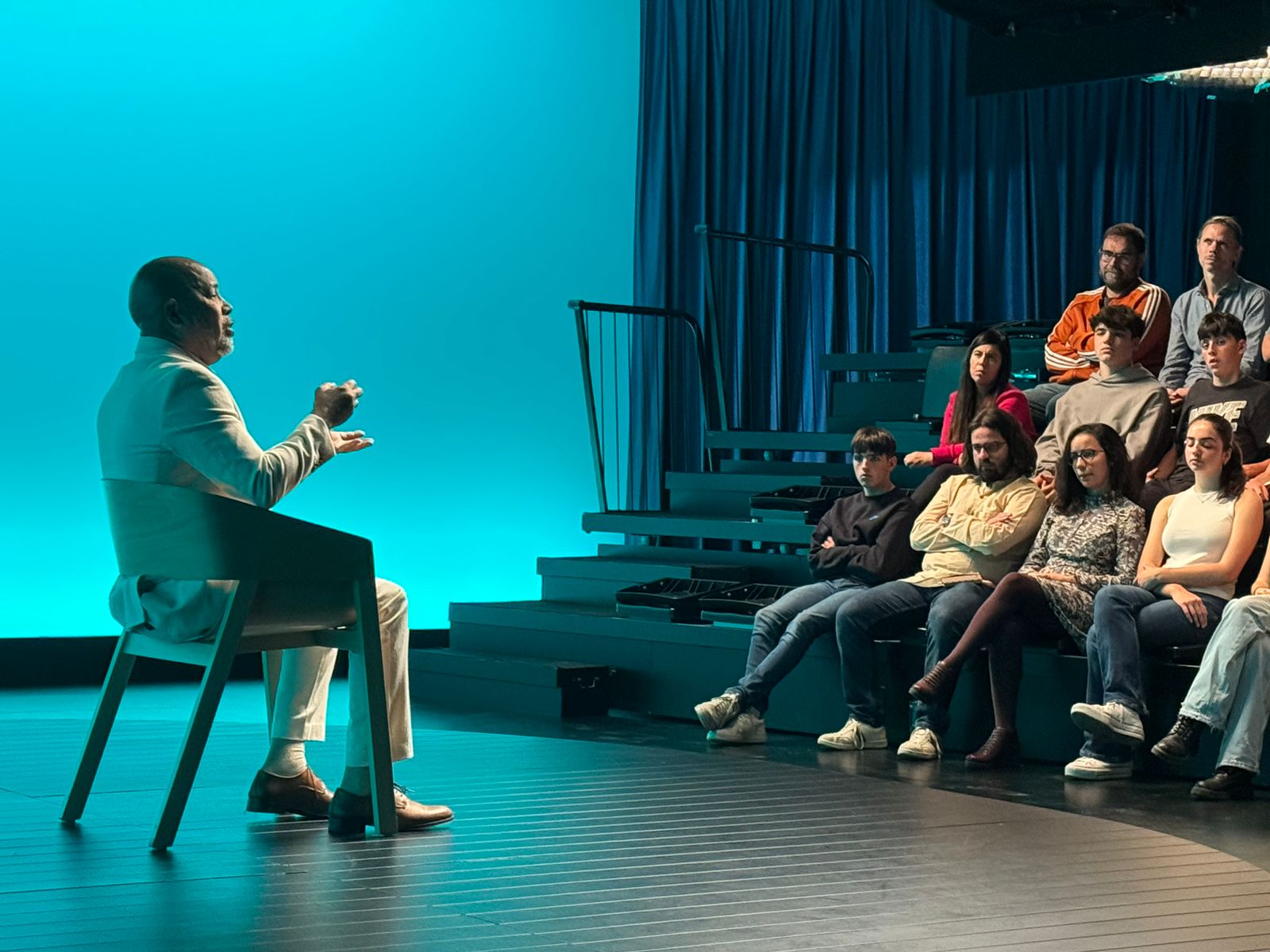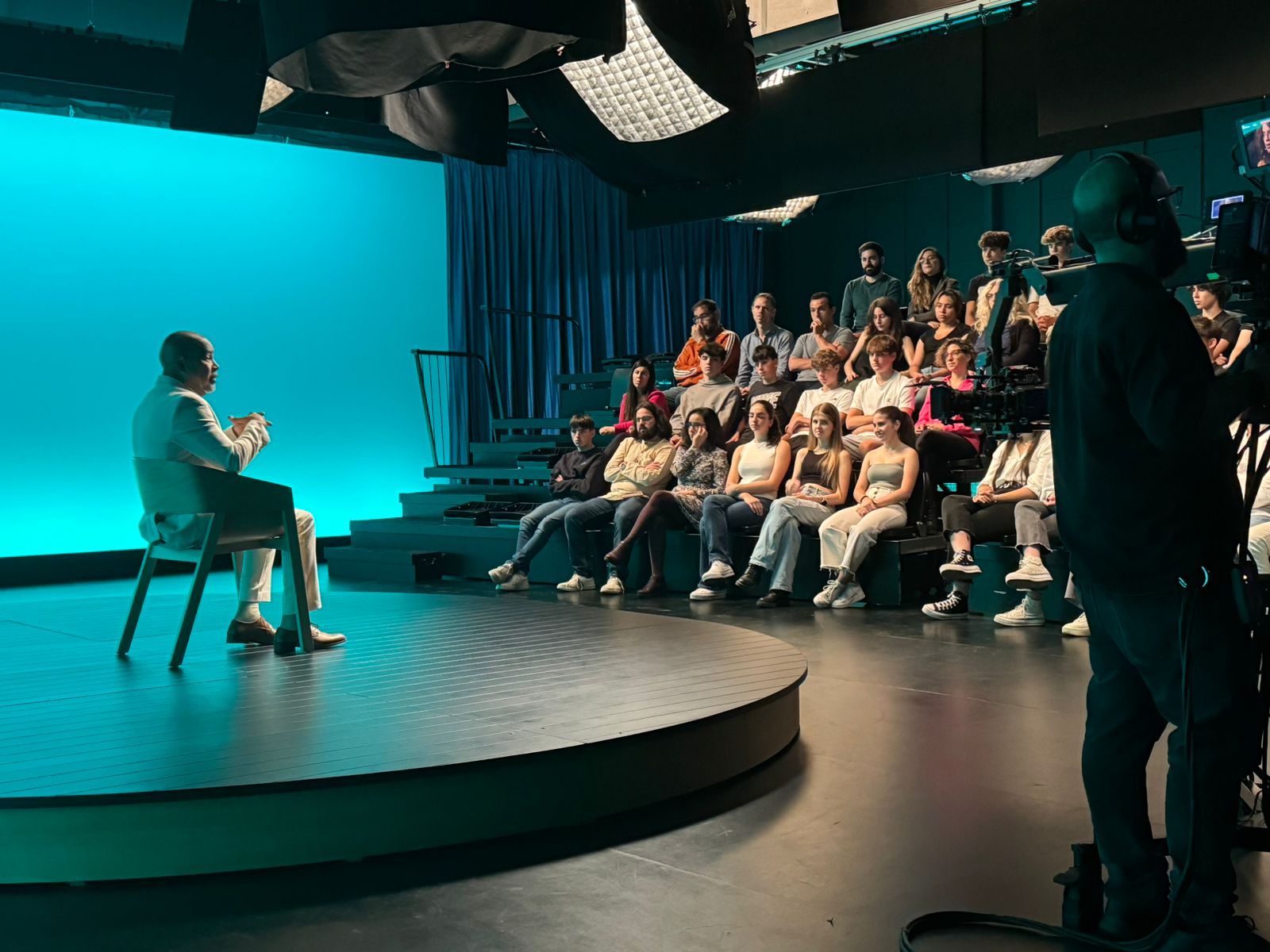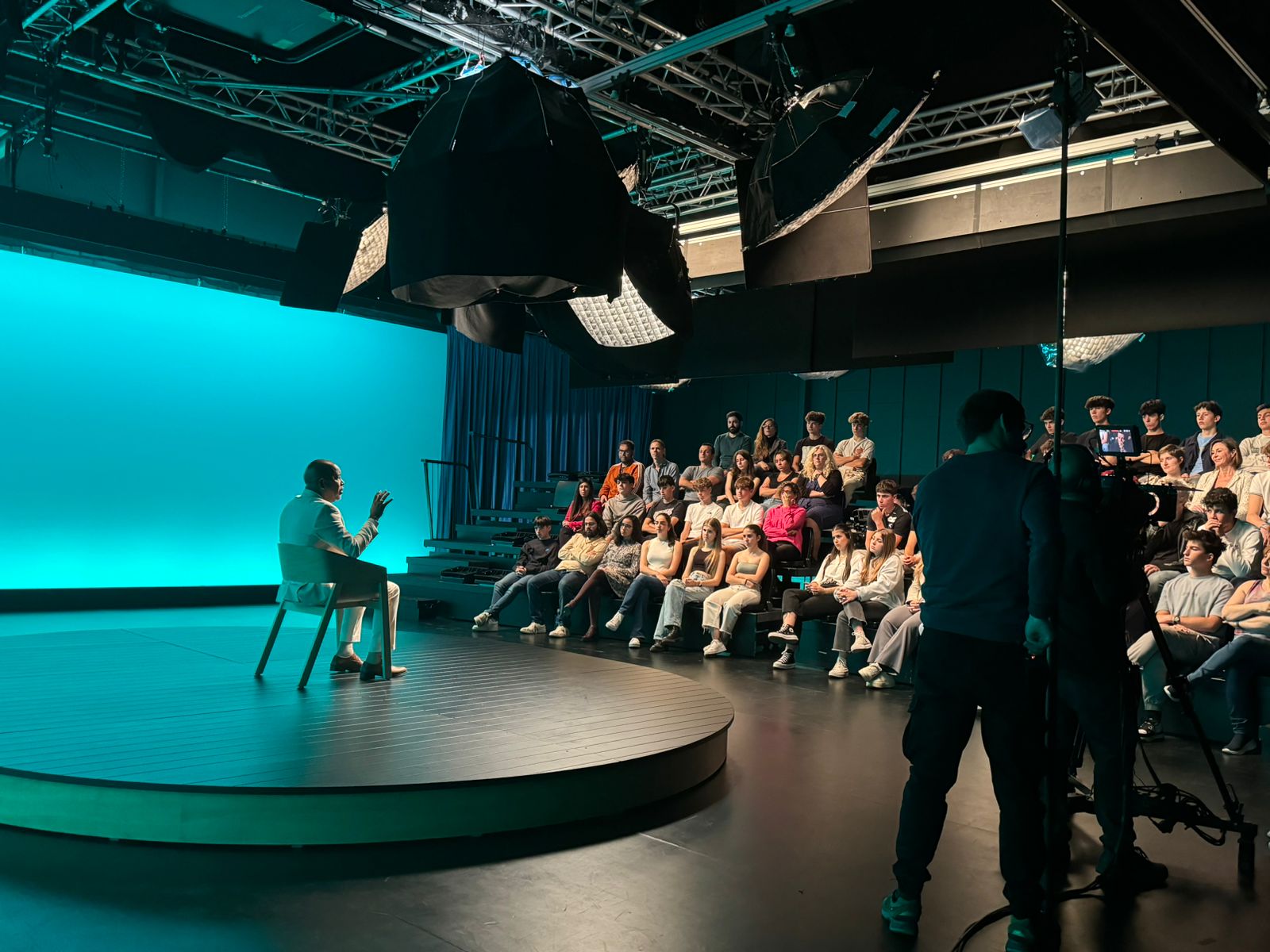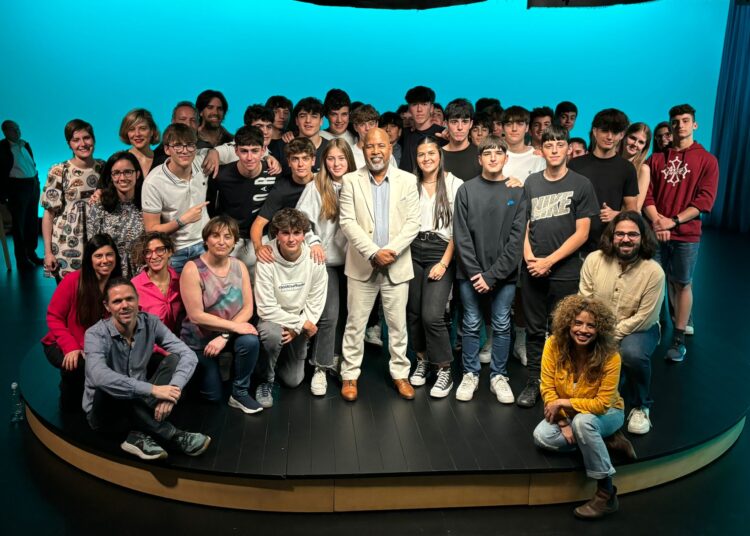Teenagers, sitting for more than two hours, without their cell phones and barely able to talk to each other. That was the challenging audience at the recording of the new episode of Aprendemos juntos (We Learn Together), from which Alexis Díaz-Pimienta elicited “what’s cool” from Madrid, a roar of applause and even very lively participation.
Alexis explained why we are all improvisers and how language is the first game we know — said by someone who, at only 5 years old, after having listened to his father a lot, recited his first rhymes. He spoke of the psychic and even physical effects of the pleasure produced by the music of words; while he successfully emerged, time and again, gracefully, from the labyrinths of the language, or managed to reach the other end of a tightrope strung by him from the first word, in real time, in front of everyone’s eyes.
Aprendemos juntos, a project of the Spanish bank BBVA, is presented as “the loudspeaker of the most brilliant minds,” with admiration for those who “dedicate themselves to teaching and light the flame of discovery.” In the invitation, the organizers described the Cuban as follows: “Considered the best improviser in the world, the greatest current authority in improvised poetry, Díaz has written more than 50 titles (essay, novel, short story, poetry, and children’s and youth literature) and has toured theaters in more than thirty countries on five continents, sharing stages with artists such as Silvio Rodríguez, Joaquín Sabina, Omara Portuondo and Compay Segundo, among many others.”
“Many others” includes collaborations with Jorge Drexler, Juanes (in Vida cotidiana, an album that won a Latin Grammy), Julieta Venegas, Natalia Lafourcade… But Alexis has not only had famous students and collaborators: thanks to his good offices as an educator, the flame of the décima has been ignited in thousands of people through the Pimienta Method or the inspiration that he represents on stage.
Since 2016, OnCuba has been lucky enough to count him among its columnists — in décimas, it couldn’t be otherwise. Taking advantage of the proximity, we asked him to tell us about the Intelligent Reggaeton course of his online academy and, of course, about the participation in Aprendemos juntos, an endeavor recognized by the United Nations and which, combined with different digital platforms, accumulates several million views since its emergence.

Aprendemos juntos seeks to promote education and alternatives for a quality life. How is that purpose connected to improvisation?
Poetic improvisation in any strophic form and any style, whether sung or spoken, is inextricably linked to learning processes and cognitive growth.
Every exercise of improvisation generates linguistic, memorial and expressive growth, therefore, learning to improvise and practicing improvisation in any form is beneficial, in every sense.
I have been dedicated to teaching poetic improvisation for many years, in Cuba, Spain, and many other countries. I have even been able to take my methodology for teaching improvisation to other languages, such as Catalan, Mallorcan, Portuguese or Italian. In all cases, children and adults acquire communication skills and enhance their creativity through language. When I participated in the 16th Congress of the Royal Academy of Language, which took place in Puerto Rico, my presentation was titled “Poetic improvisation as a pedagogical tool.”
I think that our schools greatly waste the possibilities of improvising verses, at all levels. Luckily, there are always alternative spaces and I have created many myself to demonstrate it: a chair at the University of the Arts in Havana, a national project of improvisation schools, in Cuba, an experimental school in the Alpujarra of Granada, and an online academy specialized in improvisation and oral arts: my Academia Oralitura. And from these spaces, I have trained thousands of people to apply improvisation techniques in any art: written literature, song, theater, journalism, and even cinema.
I have students who have developed their professional careers in disciplines other than improvisation, but applying techniques that they learned with me: students who are singer-songwriters, rappers, writers, editors, theater actors, filmmakers, or educators, and who apply games and exercises of the Pimienta Method for their creations and personal growth.
This is directly linked to the objectives of the Aprendemos juntos program. And, of course, all these people who improvise and teach or learn to improvise and improve their quality of life as speakers, as communicators, as creative. Quality of life + education + improvisation is a sum that tends to infinity.
What is the Pimienta Method and how can it influence those who approach it?
The Pimienta Method is 100% playful. Following the teachings of Rodari and Huizinga, I have converted all the sections of my book Teoría de la improvisación poética, an essay that probes the internal mechanisms that improvisers use, in games so that, in a relaxed and effective way, students enhance their creative possibilities with language.
The Pimienta Method has given incredible results in all the schools and workshops that I have set up, both in Cuba and in Spain. And currently, it is the method used in almost all schools of poetic improvisation that have opened in Latin America: in Chile, Puerto Rico, Mexico, Argentina, and even in Brazil, in Portuguese.
Playing with language, with rhyme, synonymy, meter, prosody, verses, stanzas, and the techniques specific to each of the manifestations of improvisation, we create new worlds. We played at being poets and we ended up being poets.

What is Academia Oralitura?
Academia Oralitura is my biggest project, the first online academy specialized in improvisation and other oral arts.
We have been bringing this type of teachings around the world for more than a decade. Based in Almería, we have taught face-to-face courses in many cities in Spain, such as Madrid, Cádiz, or Seville, but the essence of our academy is online teaching. In such a way that we have had a global reach, with students from more than 30 countries and truly impressive figures: more than 4,000 students have passed through our academy, especially from the time of the pandemic to date.
One of its attractions, in addition to the subjects, is the teaching staff. In each of the disciplines we teach, we have been able to count on top-level teachers. In the song, for example, great artists such as Jorge Drexler, Juanes, Javier Ruibal, Andrés Calamaro, Gema Corredera, Natalia Lafourcade, Julieta Venegas, Marwan, Nano Stern, Pala and a long etc. have been teachers at our academy. In the theatrical Impro, Omar Argentino. In classical theater in verse, Gabriel Garbizu. In poetry and palindrome, Pedro Poitevin. In stage oral narration, Pep Bruno or Héctor Urién. All big names.
Thus, our academy has become an online university specialized in oral arts, which is attended, systematically and recurrently, by students from all over the world to meet and learn with the best in each discipline. And with other students interested in these subjects. They are poetry and language geeks.
Ver essa foto no Instagram
Why do you say that we are all improvisers?
Improvisation is, in reality, the most natural and congenital of human attitudes. We improvise all the time, every one of us, in all situations.
However, when talking about “improvisation,” there is an interesting conceptual dichotomy. On the one hand, it is seen as something negative and receives the worst qualifications in some human activities such as politics or science. Activities that require prior and careful planning. And, on the other hand, in the arts improvisation has always existed and has always been surrounded by praise and some mystery. In theater, in music, in poetry. The comedy of Italian art, in the Renaissance, had a strong improvisation component. Jazz, which forever interrupted the musical taste of the 20th century, is essentially improvised music. And improvisation is the generic name for all the forms of poetic improvisation that exist. “Traditional improvisation” (paya, punto cubano, huapango arribeño, bertsolarismo, etc.) or “contemporary improvisation” (hip hop, rap, freestyle).
When we talk about improvisation, we only think of artistic improvisation. But, I repeat, we are all improvisers, we are all capable of improvising continuously. Any conversation, in conversational Spanish, is improvised, not planned; I even always say that even literature written in the original moment of the mechanical exercise of writing is improvisation and that writers, what they do (what we do) a posteriori, de-improvise what is improvised: call it correction, revision or rewriting.
I believe that we must lose the fear of improvisation and I firmly believe that it is important to enhance everyone’s improvisation capacity in all disciplines. It is a master key that opens all doors, an invisible Ariadne thread to get out of any labyrinth.
Applying improvisation techniques, for example, next week I will teach a course at Academia Oralitura on reggaeton. It is titled “Intelligent Reggaeton: dancing with the text, thinking with the body,” and it is not an oxymoron or a provocation: it is a proposal. I want to show that poetic improvisation and creation can be useful even in arts that seem to be at the other extreme.
More than ten years ago, a rock album with décimas of mine was released in Mexico. Más Pimienta al rock’n’roll is the name of the album and in that project, we demonstrated that the décima, so identified with country and traditional improvisation, has no limits and can even become a verse for rock. Well, now we will do it with reggaeton. Reggaeton in décimas? Why not. It will be a perfect pairing: urban music par excellence, apparently far from traditional poetic improvisation, and décima music. It will be great fun. Everyone is invited.
What particularities does language have as a working instrument?
Language conditions the way we speak, the way we think, and even the way we live. That is why it is different to improvise in Spanish than in Italian, English, or Basque.
My teacher, Indio Naborí, when I was a teenager, told me that each poem is born with its own emotion. I would say the same about languages. Composing, improvising and singing in English is not the same as in Spanish. That is why stylistic imitations from one language to another do not always work. Trying to trace, for example, the syntactic structures of English (so monosyllabic and contractive) into Spanish (rap, rock, hip hop in all its extension) does not always give good results.
The best songs in these genres have been achieved by those who, knowing the morphological structure of the Spanish language, have adapted these rhythms to our language, or have adapted our language to those rhythms, using “anti-orality techniques,” sometimes in an intuitive, but very intelligent way. This avoids, for example, pronunciation errors or gratuitous and forced accent permutations.

You have said that an improviser is a demiurge and also a tightrope walker….
An improviser is a demiurge, I’ve been saying it for years, and at the same time a tightrope walker. The concept “demiurge” comes from Platonic and Neoplatonic philosophy, and has to do with the ability to create universes, the deific spirit.
A demiurge is a creator of worlds. It literally means “master,” “supreme craftsman,” “maker.” We return to Borges’ maker, and to his Aleph, that point where all the points are.
An improviser can create everything from nothing. He is a maker of linguistic worlds, a craftsman of language, a demiurge. That is why it is so important to teach children to improvise: to make them doers and be aware of their potential and possibilities with a primal raw material: language.
Our brain has great plasticity: the ability to adapt and grow. The child’s brain is the perfect machine because it allows it to continually generate and regenerate its own labyrinths to enter and exit them. Enhancing this creative capacity in children is guaranteeing the emergence of creative adults in any discipline, adults who will never get stuck in a labyrinth because they will know how, with the master key of language, to get out of it.
And this demiurge is at the same time a tightrope walker, because he acts in public, in front of several peers, speakers and recipients who become spectators, with all that this entails. “Spectator” and “expectator,” in the sense of being expectant, but also of being a recipient and provider of expectations.
An improviser of décimas, for example, as soon as he enunciates syllable one of verse one, opens a labyrinthine game that only ends at syllable 80 of verse 10. This is for me an imaginary thread, a virtual tightrope 80 syllables long, through which the poet walks with his arms raised, devoid of protection, given to everyone, for a certain number of seconds. This journey creates a spectator silence and opens up multiple expectations in the listeners, who follow the speaker-performer-improviser’s journey from syllables 1 to 80, holding him in suspense with their eyes and waiting for him to reach the end.
When the poet finishes his décima and jumps onto the stage from the 80th syllable without having fallen, then comes the emotion, the applause, the smile: the reward of the expectant and spectator public, who has witnessed the linguistic feat.
But, even when the tightrope walker makes a mistake, and gets stuck (falls) halfway along the path (in syllable 32, for example, the last of the fourth verse), the audience rewards him with applause because they are aware of how difficult the path is.
All this preserves the essence of this art: a playful spirit, more than a circus spirit, shared entertainment, co-authorship of the linguistic spectacle. The demiurge and tightrope walker poet provides the words, but the receiving public provides the stimuli: expectation is also a stimulus. Meeting expectations is very good. Applause. But exceeding expectations is the best and what all improvisers seek. More applause. Standing applause. Applause and whistles. Applause and smiles and hugs and creative complicity.
Improvisation does not have a passive audience. The audience of every improvisation act is an active audience that conditions — and often determines — the execution of the act itself. That is why to a certain extent the public is co-author of the poem, co-author of the work, and applauds itself when these come out well.
Written literature is an essentially solitary art. Poetic improvisation is, above all, a collective art, although it is often only formed by two: a performer and a listener, or by two performers who challenge each other in a controversy, two makers of poetic worlds, of linguistic worlds. Two tightrope walkers who walk the same tightrope in the opposite direction and cross paths but do not fall and repeat the path over and over again until the end of the dialogue.
For all this, I am happy to see that a program as sublime as Aprendemos juntos has opened its space to poetic improvisation, which, although it may not seem like it, is still quite unknown. Unknown, in every sense: its importance, its history, its evolution, its techniques, its existence, and its capacity to generate sources of personal and spiritual growth in everyone, equivalent to a higher quality of life as speakers.










